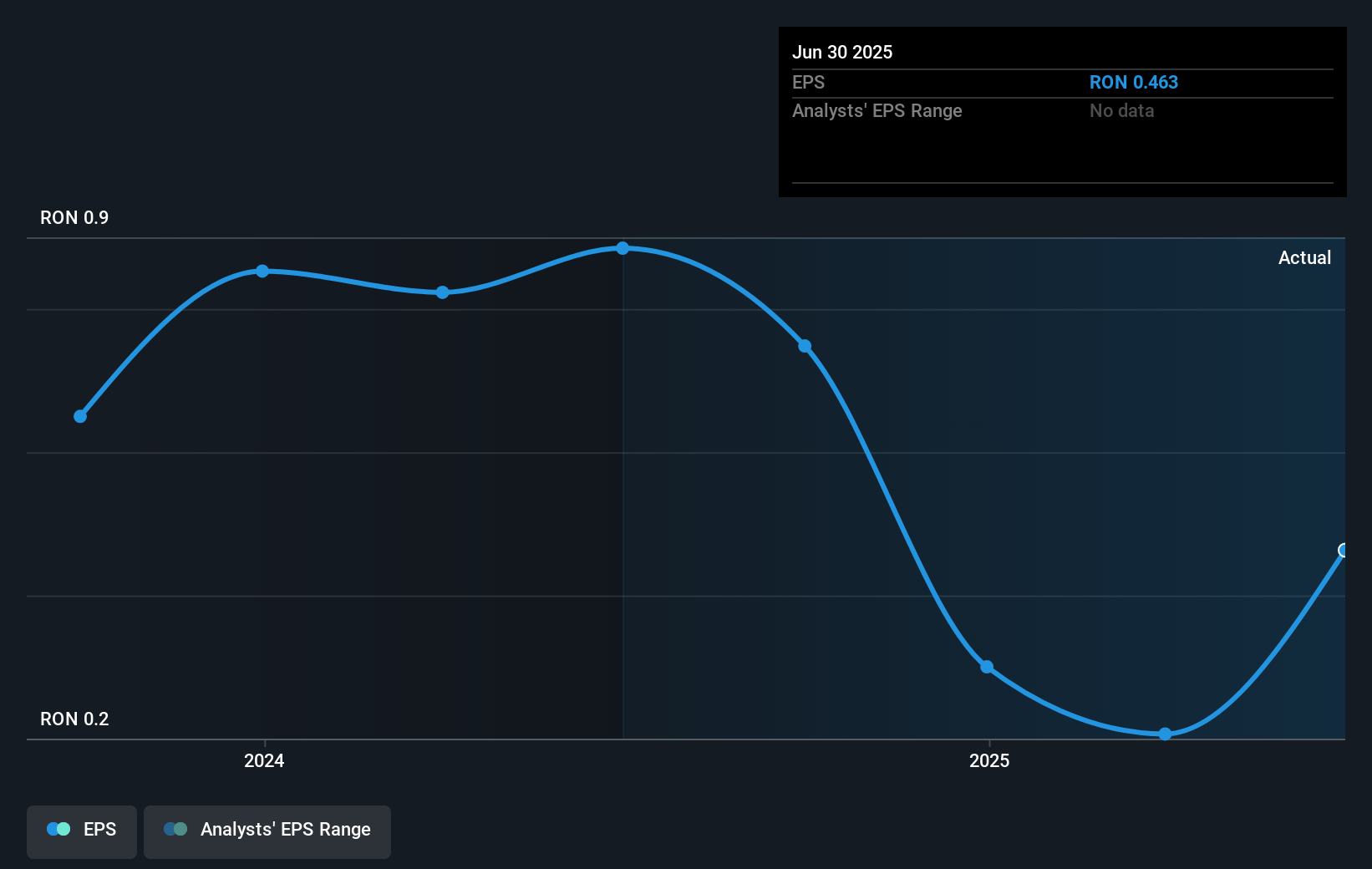- Romania
- /
- Capital Markets
- /
- BVB:LION
Lion Capital (BVB:LION) stock performs better than its underlying earnings growth over last five years
The main point of investing for the long term is to make money. Furthermore, you'd generally like to see the share price rise faster than the market. Unfortunately for shareholders, while the Lion Capital S.A. (BVB:LION) share price is up 97% in the last five years, that's less than the market return. On a brighter note, more newer shareholders are probably rather content with the 31% share price gain over twelve months.
Since the stock has added RON187m to its market cap in the past week alone, let's see if underlying performance has been driving long-term returns.
To paraphrase Benjamin Graham: Over the short term the market is a voting machine, but over the long term it's a weighing machine. One flawed but reasonable way to assess how sentiment around a company has changed is to compare the earnings per share (EPS) with the share price.
Over half a decade, Lion Capital managed to grow its earnings per share at 104% a year. The EPS growth is more impressive than the yearly share price gain of 15% over the same period. So it seems the market isn't so enthusiastic about the stock these days. This cautious sentiment is reflected in its (fairly low) P/E ratio of 8.06.
The company's earnings per share (over time) is depicted in the image below (click to see the exact numbers).

Dive deeper into Lion Capital's key metrics by checking this interactive graph of Lion Capital's earnings, revenue and cash flow.
What About Dividends?
As well as measuring the share price return, investors should also consider the total shareholder return (TSR). Whereas the share price return only reflects the change in the share price, the TSR includes the value of dividends (assuming they were reinvested) and the benefit of any discounted capital raising or spin-off. It's fair to say that the TSR gives a more complete picture for stocks that pay a dividend. In the case of Lion Capital, it has a TSR of 138% for the last 5 years. That exceeds its share price return that we previously mentioned. The dividends paid by the company have thusly boosted the total shareholder return.
A Different Perspective
Lion Capital's TSR for the year was broadly in line with the market average, at 31%. That gain looks pretty satisfying, and it is even better than the five-year TSR of 19% per year. It is possible that management foresight will bring growth well into the future, even if the share price slows down. While it is well worth considering the different impacts that market conditions can have on the share price, there are other factors that are even more important. Consider risks, for instance. Every company has them, and we've spotted 1 warning sign for Lion Capital you should know about.
If you like to buy stocks alongside management, then you might just love this free list of companies. (Hint: many of them are unnoticed AND have attractive valuation).
Please note, the market returns quoted in this article reflect the market weighted average returns of stocks that currently trade on Romanian exchanges.
New: AI Stock Screener & Alerts
Our new AI Stock Screener scans the market every day to uncover opportunities.
• Dividend Powerhouses (3%+ Yield)
• Undervalued Small Caps with Insider Buying
• High growth Tech and AI Companies
Or build your own from over 50 metrics.
Have feedback on this article? Concerned about the content? Get in touch with us directly. Alternatively, email editorial-team (at) simplywallst.com.
This article by Simply Wall St is general in nature. We provide commentary based on historical data and analyst forecasts only using an unbiased methodology and our articles are not intended to be financial advice. It does not constitute a recommendation to buy or sell any stock, and does not take account of your objectives, or your financial situation. We aim to bring you long-term focused analysis driven by fundamental data. Note that our analysis may not factor in the latest price-sensitive company announcements or qualitative material. Simply Wall St has no position in any stocks mentioned.
About BVB:LION
Lion Capital
SIF Banat-Crisana is a self-managed closed-end investment company and since March 2018, it is authorized by ASF as alternative investment fund manager.
Flawless balance sheet and slightly overvalued.
Market Insights
Community Narratives




